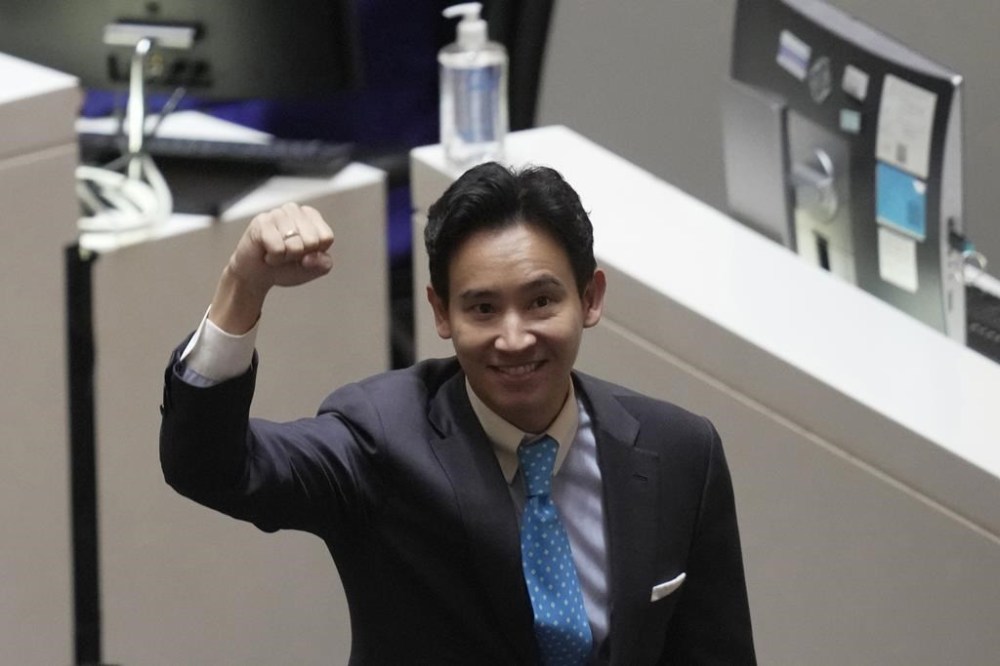Court in Thailand will decide whether politician blocked as prime minister will also lose his seat
Advertisement
Read this article for free:
or
Already have an account? Log in here »
To continue reading, please subscribe:
Monthly Digital Subscription
$0 for the first 4 weeks*
- Enjoy unlimited reading on winnipegfreepress.com
- Read the E-Edition, our digital replica newspaper
- Access News Break, our award-winning app
- Play interactive puzzles
*No charge for 4 weeks then price increases to the regular rate of $19.00 plus GST every four weeks. Offer available to new and qualified returning subscribers only. Cancel any time.
Monthly Digital Subscription
$4.75/week*
- Enjoy unlimited reading on winnipegfreepress.com
- Read the E-Edition, our digital replica newspaper
- Access News Break, our award-winning app
- Play interactive puzzles
*Billed as $19 plus GST every four weeks. Cancel any time.
To continue reading, please subscribe:
Add Free Press access to your Brandon Sun subscription for only an additional
$1 for the first 4 weeks*
*Your next subscription payment will increase by $1.00 and you will be charged $16.99 plus GST for four weeks. After four weeks, your payment will increase to $23.99 plus GST every four weeks.
Read unlimited articles for free today:
or
Already have an account? Log in here »
Hey there, time traveller!
This article was published 23/01/2024 (683 days ago), so information in it may no longer be current.
BANGKOK (AP) — Thailand’s Constitutional Court is set to decide Wednesday whether popular politician Pita Limjaroenrat, who was blocked from becoming prime minister, should now lose his seat in Parliament.
The election victory last year by Pita’s progressive Move Forward party reflected a surprisingly strong mandate for change among Thai voters after nearly a decade of military-controlled government. But the party was denied power by members of the unelected and more conservative Senate.
Pita was suspended from his lawmaking duties pending the court ruling Wednesday on whether he violated election law due to his ownership of shares in ITV, a company that is the inactive operator of a defunct independent television station.

By law, candidates are prohibited from owning shares in any media company when they are registered to contest an election.
The Senate, whose members are appointed by the military, cast votes to choose a prime minister, under a constitution that was adopted in 2017 under a military government. The Move Forward party now heads the opposition in Parliament.
In an interview with The Associated Press earlier this month, Pita acknowledged that precedents set by court rulings in similar cases do not appear to favor his chances, but said he is confident that he will prevail and be able to return to Parliament.
“I had no intention of holding the shares. I had no influence on the company, a defunct company,” Pita said, adding that the number of shares, which he formerly held as an executor of his late father’s estate, was so insignificant it would not give him any political advantage.
Wednesday’s ruling is not the only serious legal challenge he faces this month.
On Jan. 31 Pita will return to court, where he and his party stand accused of attempting to overthrow Thailand’s system of government by proposing to amend a law that makes it illegal to defame Thailand’s royal family, an offense known as lese majeste.
Critics say the lese majeste law, which carries a penalty of up to 15 years in prison, is often abused as a political weapon.
While the complaint to the Constitutional Court on Move Forward and its policy on the royal defamation law only calls on the party to stop promoting the change, the party’s current leader, Chaithawat Tulathon, has acknowledged that an unfavorable ruling could be used to advance future cases against them that could lead to the party’s dissolution. Move Forward’s predecessor, the Future Forward party, was dissolved by a Constitutional Court ruling in 2020.
Move Forward’s supporters have criticized the cases as the sort of dirty tricks that have long been used by the ruling conservative establishment to hamper or oust political rivals, by utilizing the courts and nominally independent state agencies such as the Election Commission as an effective legal weapon.

